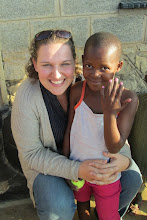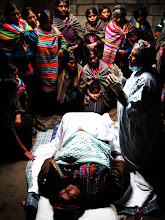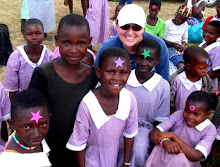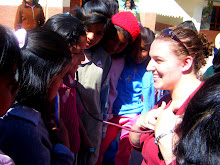Tomorrow is my birthday... I will be 24 years old. This year my birthday won't be reigned in with tickets to "The Lion King" on broadway, tres leche cake at my favorite Cuban restaurant with my best friends, a BBC movie marathon, or a homemade birthday cake from my mother. I won't be receiving any beautifully wrapped presents, surprise cupcakes from my colleagues in the middle of the work day, or flowers from my parents... In fact, it's entirely likely that no one in Ha Selomo will ever know that, for me, another year of life has passed. Yet what I do have this year, is time to think and be thankful.
I am 24 years old. I have accomplished almost none of the "mile markers" my 14 year-old self once longingly dreamed of... I am not married, in medical school, or having children. I do not own my own house, have a well-paying job, an overflowing bank account, or even own a car (since I sold my beloved Honda to my parents a few months ago.) In short, my life today is not what I imagined it would be... It's better.
I am 24 years old, and I have none of the things most American girls dream of. What I do have is:
I have amazing parents, who each in their own way encouraged me to dream beyond convention.
I have 2 hilariously goofy, and absolutely irreplaceable siblings- Each of whom are accomplished and unique in their own right.
I have friends around the world, each as unique as they are inspirational.
I have traveled to 5 of the 7 continents.
I have attended the graduate school of my dreams.
I have moved 12 times in my life.
I have a place to call home, no matter where in the world I travel.
I have studied and loved subjects ranging from Tissue Engineering to Phenomenology.
I have hiked the ruins of Pisac, and sat on Machu Picchu.
I have spent all day curled up in bed with a good book.
I have traveled to over 15 countries.
I have made attempts at learning 6 different languages.
I have mastered one of them. :)
I have meditated with a Mayan priest in a sweat lodge in Guatemala.
I have worshiped to the sound of Masaai song and dance in Kenya.
I have witnessed birth and death.
I have been a Peace Corps Volunteer.
I have cried with and felt love for complete strangers.
I have gotten stuck on a dirt road in the middle of “nowhere” Lesotho, and loved every minute of it.
I have lived in 4 foreign countries.
I have been a high school teacher (1 month and counting!)
I have worked for one of my favorite non-profits- The American Cancer Society.
I have experienced true grief and extreme joy.
I am blessed. My birthday wish is that during the inevitable challenges and occasional loneliness of the coming year,I never forget that much.
With Love from Lesotho… Mary E.





